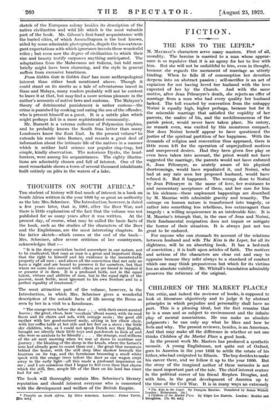THOUGHTS ON SOUTH AFRICA.* Tax student of history will find
much of interest in a book on South Africa written in the year 1896 by so great an authority as the late Mrs. Schreiner. The Introduction, however, is dated a few years later, that is, 1901, after the Boer War, and there is little explanation of the fact that the volume was not published for so many years after it was written. At the present day, of course, what may be called the basic facts of the book, such as the studies of the characters of the Boer and the Englishman, are the most interesting chapters. In the latter sketch—which comes at the end of the book— Mrs. Schreiner, after severe criticism of her countrymen, acknowledges that :— "it is the deep conviction buried somewhere in our nature, not to be eradicated, that man as man is a great and important thing, that the right to himself and his existence is the incontestable property of all men ; and above all the conviction that not only we have a right and are bound to preserve it for ourselves, but that where we come into contact with others we are bound to implant it or preserve it in them. It is a profound faith, not in the equal talent, virtues and abilities of men, but in the equal right of the poorest, most feeble, most ignorant to his own freedom and to a perfect equality of treatment.'
The most attractive part of the volume, however, is the Introduction, in which Mrs. Schreiner gives a wonderful description of the outside facts of life among the Boers as seen by her in a visit to a farmhouse.
"The orange-trees before the door . . . with their sweet-scented leaves ; the great, clean bare `voorhuis ' (front room), with its mud floors and its chairs and sofa with reimpje seats ; the good old mother with her good-natured smile, sitting in her elbow chair, with her coffee table at her side and her feet on a stove ; the little shy children, who, as I could not speak Dutch nor they English, brought me silently their little toys and patchwork to look at and who were so anxious to be friendly ; . . . the strange, cool stillness of the air next morning when we rose at dawn to continue our journey ; the bleating of the sheep in the kraals, where the farmer's sons had already gone to count them out ; the great blue mountain behind the house, with the still deep blue shadow beneath the krantzes on its top, and the farmhouse becoming a small white speck with the orange trees before the door as our wagon crept away in the early light—all this made a profound impression on me ; and I am conscious that I began to feel even then that charm which the still, free, simple life of the Doer on his land has since had for !lie."
The book will thoroughly sustain Mrs. Schreiner's literary reputation and should interest everyone who is concerned with the development and welfare of the British Empire.
• Thoulhts on South Africa. By 011re Schreiner. London : Fisher Unwin. net.)


































 Previous page
Previous page